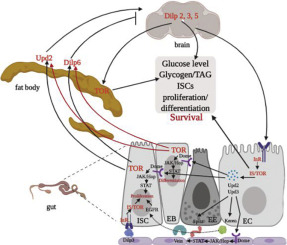当前位置:
X-MOL 学术
›
Comp. Biochem. Physiol. B Biochem. Mol. Biol.
›
论文详情
Our official English website, www.x-mol.net, welcomes your feedback! (Note: you will need to create a separate account there.)
TOR signaling inhibition in intestinal stem and progenitor cells affects physiology and metabolism in Drosophila.
Comparative Biochemistry and Physiology B: Biochemistry & Molecular Biology ( IF 2.2 ) Pub Date : 2020-02-20 , DOI: 10.1016/j.cbpb.2020.110424 Olha M Strilbytska 1 , Kenneth B Storey 2 , Oleh V Lushchak 1
Comparative Biochemistry and Physiology B: Biochemistry & Molecular Biology ( IF 2.2 ) Pub Date : 2020-02-20 , DOI: 10.1016/j.cbpb.2020.110424 Olha M Strilbytska 1 , Kenneth B Storey 2 , Oleh V Lushchak 1
Affiliation

|
In all eukaryotic organisms, the control of growth, metabolism, reproduction, and lifespan is realized by interactions of genetic and environmental signals. An important player in the regulatory network is the target of rapamycin (TOR) signaling pathway, which is triggered by nutritional cues. Given the pivotal role of TOR in regulating multiple processes in organisms, we inhibited TOR by inducible expression of specific RNAi in Drosophila intestinal stem and progenitor cells or progenitor cells alone. We found that TOR inhibition in stem and progenitor cells shortened the lifespan on both regular diet and under malnutrition. Moreover, flies became more short-lived under starvation or oxidative stress conditions if TOR was inhibited. TOR-RNAi expression resulted in a decrease in body glycogen and TAG levels. All these physiological and metabolic changes might be partially explained by significant changes in mRNA levels for genes encoding the Drosophila insulin-like peptides (dilp2, dilp3 and dilp5) with subsequent effects on insulin signaling to modulate gene expression in peripheral tissues (e.g. tobi and pepck transcripts). In the gut, a strong increase in transcript levels of cytokines upd2, upd3 and downstream target socs36e of the JAK/STAT signaling pathway in the gut indicate an important role for this signaling pathway when TOR is inhibited.
中文翻译:

肠道干细胞和祖细胞中TOR信号的抑制会影响果蝇的生理和代谢。
在所有真核生物中,生长,代谢,繁殖和寿命的控制都是通过遗传和环境信号的相互作用来实现的。雷帕霉素(TOR)信号通路的靶标是调节网络中的重要角色,该信号由营养线索触发。鉴于TOR在调节生物体多个过程中的关键作用,我们通过在果蝇肠道干细胞和祖细胞或仅祖细胞中诱导特定RNAi的表达来抑制TOR。我们发现干细胞和祖细胞中的TOR抑制会缩短常规饮食和营养不良下的寿命。此外,如果TOR被抑制,果蝇在饥饿或氧化应激条件下的寿命会更短。TOR-RNAi表达导致体内糖原和TAG水平降低。所有这些生理和代谢变化可能部分由果蝇胰岛素样肽(dilp2,dilp3和dilp5)编码基因的mRNA水平的显着变化部分解释,随后对胰岛素信号传导产生影响,从而调节外周组织中的基因表达(例如tobi和pepck)成绩单)。在肠道中,肠道中JAK / STAT信号通路的细胞因子upd2,upd3和下游靶标SOCS36e的转录水平显着增加,表明当TOR被抑制时,该信号通路的重要作用。
更新日期:2020-02-20
中文翻译:

肠道干细胞和祖细胞中TOR信号的抑制会影响果蝇的生理和代谢。
在所有真核生物中,生长,代谢,繁殖和寿命的控制都是通过遗传和环境信号的相互作用来实现的。雷帕霉素(TOR)信号通路的靶标是调节网络中的重要角色,该信号由营养线索触发。鉴于TOR在调节生物体多个过程中的关键作用,我们通过在果蝇肠道干细胞和祖细胞或仅祖细胞中诱导特定RNAi的表达来抑制TOR。我们发现干细胞和祖细胞中的TOR抑制会缩短常规饮食和营养不良下的寿命。此外,如果TOR被抑制,果蝇在饥饿或氧化应激条件下的寿命会更短。TOR-RNAi表达导致体内糖原和TAG水平降低。所有这些生理和代谢变化可能部分由果蝇胰岛素样肽(dilp2,dilp3和dilp5)编码基因的mRNA水平的显着变化部分解释,随后对胰岛素信号传导产生影响,从而调节外周组织中的基因表达(例如tobi和pepck)成绩单)。在肠道中,肠道中JAK / STAT信号通路的细胞因子upd2,upd3和下游靶标SOCS36e的转录水平显着增加,表明当TOR被抑制时,该信号通路的重要作用。



























 京公网安备 11010802027423号
京公网安备 11010802027423号